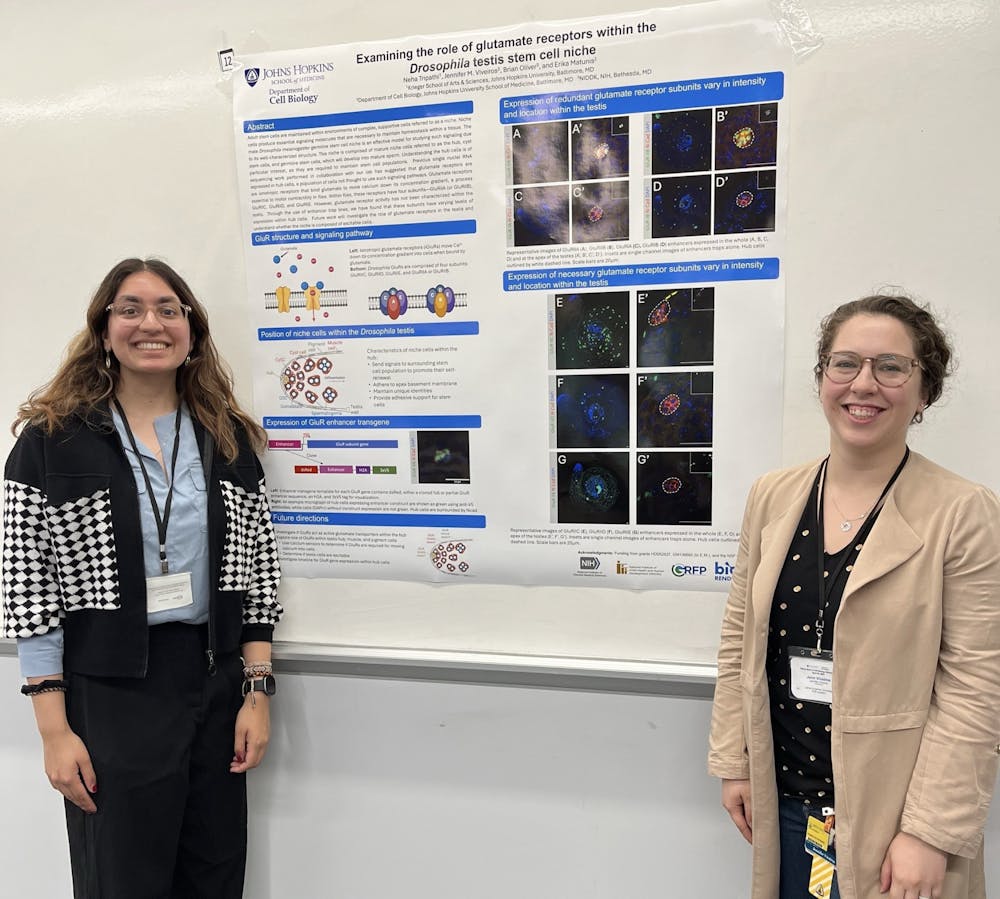
Neha Tripathi, a senior studying Molecular and Cellular Biology and Public Health, is currently a member of the Matunis Lab. The lab, located at the School of Medicine, generally focuses on stem cell dynamics and regeneration. During an interview with The News-letter, Tripathi shared information about her research journey and described not only her role but also the greater importance of her research work.
Her research journey started in a rather unexpected fashion. During the summer after her freshman year, Tripathi was actively looking for a research position.
Upon speaking to one of her friends, she learned that one of the graduate students in the Matunis Lab was seeking an undergraduate assistant; the work involved flies and genetics. Ecstatic about the opportunity, Tripathi quickly emailed her current mentor about joining the lab. By the end of that summer, Tripathi started volunteering in the Matunis Lab in which her work was initially basic: taking numerous pictures of fly stocks that the lab already had.
Perhaps more importantly, the lab was accommodating for Tripathi. The learning experience she received was invaluable.
“I learned everything from scratch. I've used a pipette before and I've done other random science things, but I only went through the whole immunostaining process [at the lab]. I learned how to image on the confocal. And I started learning how to apply the things that I was learning in class to research,” she stated.
As a Molecular and Cellular Biology major, Tripathi found her research fascinating. The classes she was taking for her major covered topics that came up in her lab work. In her genetics class, they were completing fly crosses when Tripathi noticed that this was a major topic in her lab slide process. While learning about imaging in other biology classes, Tripathi found herself ahead since she already had the background knowledge though her lab work.
Every semester, Tripathi works on a different project with a different focus. Last summer, she spent three months trying to build a specific fly because the process was that intensive and many crosses were possible. Eventually, in the Spring of 2024, Tripathi got the chance to present her research at a symposium.
“I presented at a conference on the med campus. It’s called the [Rising Stars in Cell Biology Symposium], and it was the second year that they did it on the med campus. That was really cool. It was a whole bunch of people in the Cell Biology department, whether they be graduate student or undergraduates. I presented a poster, and, now, I’m working on a micro-publication related to the topics I’m working on currently,” she added.
Tripathi also elaborated on the current project she is working on at the lab, explaining how she is performing research on fly models.
“I’m testing glutamate receptor activity within the stem cell hub of Drosophila because there’s speculation that there’s a brain-testes connection. There aren’t any nerves in the testes, but we do see glutamate receptor activity in the testes, which is weird because, in flies, glutamate is a neurotransmitter,“ she said. “You only expect to see it at a neuromuscular junction, but there are no neuromuscular junctions in the testes. We’re trying to figure out where the activity is and what that could potentially mean.”
The Matunis lab focuses on the stem cell hub, a specialized cluster of cells within the gonads (both ovaries and testes) that plays a critical role in regulating stem cell behavior. It is also the part of the testes that sperm originates from. This cellular location includes not only the spermatogonia that originates from the hub, but also the nursing cells and other helpful cells that assist with maintaining the stem cell environment.
“We’re trying to characterize it, understand it and manipulate it, and every graduate student in the lab uses Drosophila to do so. There’s one graduate student that has mice, but she’s still looking at the stem cell hub. Ultimately, we’re trying to characterize that environment and determine what happens when you change this environment,” Tripathi stated.
Tripathi’s interest in research began in her sophomore year of high school taking AP Biology since they had to complete several independent research projects. She fell in love with science and the scientific method. She found joy in being able to create her own experiments and develop problem-solving skills. Her involvement in her biology class and completing her own smaller projects outside of school got her acquainted with the significance of research and the idea that beliefs should be backed up with evidence.
While research is certainly a focus for Tripathi, she is involved in various other campus organizations. To Tripathi, research is where she can apply her major, but being involved outside of the lab is equally as important.
“I am a very big proponent of people doing research that’s actually relevant to their majors. It’s really helpful to actually practice what you learn in class in real life because you’ll actually retain that information better,“ she said. “Outside of research, I’m a co-president of Advocates for Reproductive and Sexual Health. Reproductive health is where I thrive. I’ve also done research on endometriosis in high school, and I wrote an entire literature review on the genetic basis of endometriosis. I’m also a part of the Buttered Niblets, which is the improvisational comedy group on campus. That’s to keep me sane.”
Right now, Tripathi is leaning towards becoming an obstetrics and gynecology specialist. She looked at the possibility of being a physician-scientist, but her experiences in the wet lab, although enjoyable, have given her the sense that the lab is not where she finds herself in the future.
“Research is not predictable in real life. One can spend so much time and energy yet eventually get nothing out of it,” she said.
Yet, Tripathi believes that she learned several valuable lessons through research, crediting many of the graduate students in her lab with helping her better understand her own career path.
“They’re all at different stages, so learning how people in graduate school can still be people and not students has been really important to me,” she added. “The graduate students at the Matunis Lab have shown me how to be a person and also still be dedicated to a career path.”





